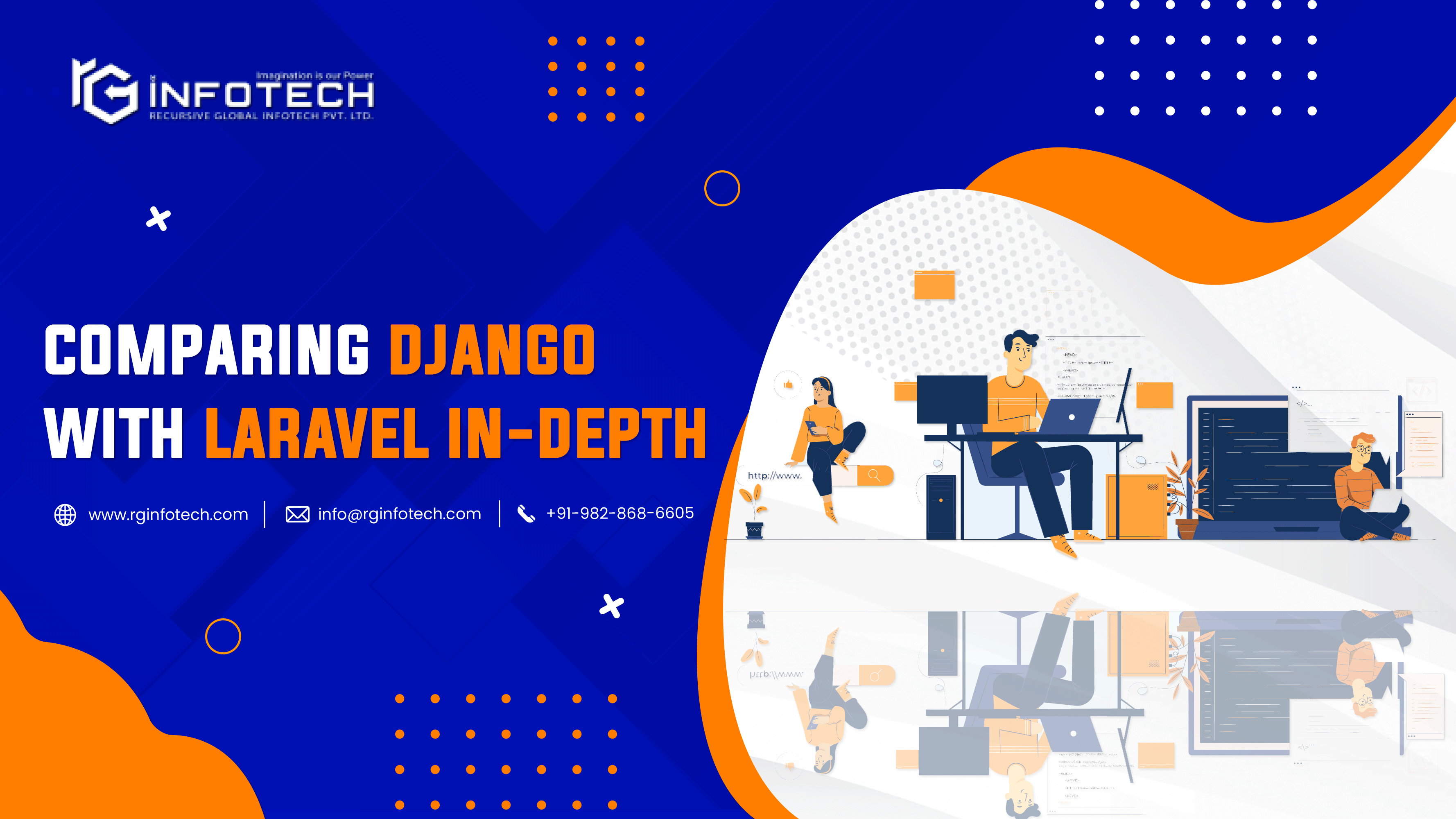Laravel Vs Django: Which Is the Better Framework in 2022
A crucial decision in web development is choosing between web frameworks like Django and Laravel. A web framework can make or break a project; it serves as the “bone” on which your online application will be built. Django and Laravel are the two most widely used web frameworks. Both have great features, capabilities, and the ability to serve and exceed user requests across a range of industry verticals. By contrasting Django vs. Laravel based on a number of factors, including user-friendliness, performance, security, scalability, support for databases and microservices, community support, and more, this essay tries to put an end to this argument. But first, let’s clarify the fundamental ideas surrounding web frameworks in general, followed by Django and Laravel. So, let’s keep reading!

Comparing Django with Laravel in-depth
To assist you in making a better decision, let’s now compare these two frameworks on a number of factors.
What’s easy to learn?
It can be difficult to compare the learning curves of Django and Laravel because they will vary from person to person. But you can infer a few things from comparing their coding and syntax. Django is simple to learn because it’s a Python-based web framework. Even for beginners, Python is a user-friendly language for developers. Although it is not as beginner-friendly because it uses regular expressions (RegEx) during routing, you may learn it with some effort. Python uses simple syntax, clear English, and clean formatting to make it easier to read than other programming languages. Instead of using curly braces, it uses whitespace indentation to provide clear visuals for the semantics.
Rare semicolons used in coding result in fewer syntactic exceptions and unusual instances. Django is relatively simple to understand, and there are fewer chances for mistakes, thanks to all these Python characteristics. On the other hand, despite having thorough documentation and a wealth of features like Laracast, Laravel has a challenging learning curve. Although Laravel is intuitive and has a wealth of learning tools, mastering it takes time.
Laravel is much more complicated than Python because it is a PHP-based framework. With function returns, loops, and if conditions, PHP’s syntax is comparable to that of C, C++, and Java. However, it employs semicolons to end sentences and is case-sensitive when it comes to variable names. For method indication, curly brackets, operators, and symbols are required. Laravel is a little more difficult to learn and master because of these PHP properties.
Performance
One of the most important aspects to take into account while creating a software application is performance. Since no one has the time or patience to deal with slow-responding websites and applications, users want the programme to operate quickly. Performance is influenced by a number of factors, including hardware resources, storage capacity, memory, etc., but also by the programming language and web framework chosen. So picking a reliable, performance-focused web framework is essential if you want your application to run smoothly. The programme must be empowered to load in no more than 2-3 seconds.
However, because Python delivers great speed and performance, Django is high-performing. Because of its quick execution and code compilation, you can hasten the web development process. Additionally, it makes it relatively simple to find and quickly fix bugs in your code. Serializing and deserializing JSON strings, processing requests through middleware, and converting database queries into Python-based objects, however, could result in worse performance. However, by using high-performance hardware, choosing the best use cases, and adhering to excellent web development principles, you may swiftly overcome these problems.
Laravel is a robust framework that has a tonne of built-in capabilities. It could occasionally be slower than other frameworks due to the availability of so many different components. Developers must therefore discover alternative strategies to quicken the development process. But Laravel’s performance and speed have improved with PHP 7 to make it more competitive.
Application Architecture
Application architecture is a crucial factor to take into account when developing a website since it enables you to customize your app to meet specific needs. It must not impose rigid rules and a rigid structure that would curtail your originality. Instead of using a rigid method, you should attempt working with a web framework that can serve as a guide. So let’s compare the application architectures of Django and Laravel. Model-Template-View (MVT) architecture is used by Django, as opposed to Model-View-Controller (MVC) architecture used by Laravel. Model, View, and Template, or MVT, is a designing pattern that includes these essential elements.
- A data access component called a model aids in managing database and data-related logic.
- View assists with carrying out your business logic, communicates with data-bearing models, and renders templates.
- The presentation layer that controls the user interface is called a template.
Instead of using MVC’s controllers, Django MVT’s template file, which contains HTML and the Django Template Language, makes it easier to create dynamic websites. Because of this, it provides greater simplicity for handling various situations where each user can have a unique feed, such as social media feeds like Instagram. Django is superior at making changes rapidly and is appropriate for all sizes of applications as a result.
However, Laravel utilizes a “controller” rather than a “template,” therefore it is still an MVC framework. Model, View, and Controller (MVC) is a design pattern that handles particular facets of the creation of a web application. To process incoming calls and business logic, manipulate data, and render the output, the controller serves as an interface between the view and model components in this case.
To carry out a productive development process, you can divide developer jobs intelligently using MVC design. While backend developers focus on the controller logic, frontend frameworks can work on the views. It gives you complete control over the programme, allowing you to simply select routes and improve its appearance. Additionally, it facilitates app logic reuse and aids in SEO optimization for your app.
A separate, reliable app backend support is an alternative, but it will be challenging to adjust and isn’t appropriate for building more complex applications.
Scalability
The scalability of your application is influenced by the web framework or programming language you employ. This is because in order to meet user and market needs, your application must scale along with the expansion of your organization. The ability to handle significant traffic, particularly during peak events, and the flexibility to scale up or down in accordance with your business objectives are provided by the correct architecture. Therefore, the first stage in your development process is determining which framework—Django or Laravel—is preferable for your application.
Along with its machine learning and artificial intelligence features, Django inherits the extremely scalable Python language. Django maintains optimal loading speeds and performance while integrating with many technologies with ease. Django will be useful whether you want to deploy ML models or build apps using decoupled, independent components. In order to assist you optimize key components for scalability, such as CSS, graphics, databases, load balancing, and more, Django simplifies a number of actions. It also enables you to scale up more easily by implementing cloud and CDN options quickly and easily. As a result, it’s regarded as one of the best frameworks for long-term scalability.
On the other hand, because Laravel employs PHP to support expanding enterprises, it also provides high scalability. You may accomplish outstanding horizontal scaling by using Laravel in conjunction with a top-notch load balancer and database. By utilizing AWS, MySQL, and sophisticated caching, you can also scale your Laravel-based applications to satisfy your current requirements. However, PHP is less adaptable than Python to meet changing trends and escalating demand. In light of this, Laravel’s scalability is likewise inferior to Django’s.
Security
Cyberattacks like DDoS attacks, cross-site scripting (XSS), malware, phishing scams, and other threats have increased in frequency and severity over time, posing larger risks to the online ecosystem. When hacks occur, all firms suffer significant losses in terms of data, user trust, reputation, and money. To protect your company’s and users’ personal information, as well as to save money, you must create an app that delivers the highest level of security. You must select a more secure web framework for this.
You won’t have to worry about creating a complex app with Django because Python’s security is superior to PHP (or an overly simplified one). One of the safest languages out there is Python. It can defend your application against almost all dangers. Django is a safer web framework as a result, of course. In order to manage user accounts and passwords, Django additionally has a secure user authentication system. Additionally, it has safeguards in place to lessen the possibility of typical security mistakes like XSS, cross-site requests, forgery, clickjacking, etc.
On the other hand, 86% of PHP-based applications contain at least one XSS vulnerability and 56% have at least one SQL injection vulnerability. It’s obvious that Laravel poses a greater security risk than Django because it uses PHP. Despite the fact that the PHP community is striving to remedy these security flaws, you might still want to go with the safer choice. To its credit, Laravel employs salted and hashed passwords that prevent passwords from being persisted in the database as plain text. Additionally, it generates an encrypted representation of the password using the “Bcrypt Hashing Algorithm.” Additionally, it has defenses against cyberattacks like XSS, SQL injection, data eavesdropping, malicious cookies, etc. Between Django and Laravel, however, Django is the more secure web framework. Big names like NASA use it because of this.
Database Support
A database is a method for keeping track of all the important documents and data associated with a project, site, or application. As a result, you’ll need a reliable database to effectively arrange and store the data for your project. It would be beneficial if you also exercised caution when accessing or altering data in the database, which houses your sensitive data. You must select the appropriate database for your project. The choice you make will rely on the needs of your project, so we’ll compare Django vs Laravel depending on the databases they support.
Databases like MySQL, Oracle, MariaDB, PostgreSQL, and SQLite are all officially supported by Django. It not only functions flawlessly with each of these databases, but it also enables you to add new databases using third-party libraries and packages. In addition, Django gives you the choice, if necessary, to use several databases concurrently. Django won’t let you down when it comes to database support. Laravel works with MySQL, PostgreSQL, SQL, and SQLite. Additionally, Eloquent ORM, raw SQL, and its simple query builder make dealing with all of these databases easier. Additionally, it makes it easier for you to connect with many databases. With Laravel, using databases won’t be a problem.
Developer Community and Support
A helpful and vibrant development community is always beneficial. Through comments and revisions, it helps the language or web framework progress, and it facilitates professional networking and assistance for one another. A vibrant developer community also offers assistance to new developers and a forum where they can get answers to their questions from industry professionals. Let’s contrast the communities and levels of support offered by Django vs Laravel. A sizable developer community for Django works to improve the web framework. Additionally, you can join their mailing list to be informed about anything that happens within the Django community. It has 82k+ Reddit subscribers, 25.1k+ GitHub forks, and 58.8+ stars.
You may discover the community on other social media channels and websites including Telegram, Discord, Slack, and Stack Overflow, where it is also highly active and growing quickly. Since Laravel is based on PHP, it draws a sizable PHP development community and has a terrific developer community as well. It has more than 8.3k forks, 62.2k+ Reddit artisans, and 24.5k+ GitHub stars. The developer community for Laravel and PHP is strong; members may be found and met on a variety of websites, including Dev, Laravel.io, Laracasts, and Stack Overflow. Developers exchange news, podcasts, manuals, and repositories.
Wrapping It All Up…
By 5 points, Django appears to be the clear winner. But that does not imply that Django is superior to Laravel! If it were, Laravel would be used by a lot fewer developers. Interestingly, Laravel is the most widely used PHP web framework; in fact, it’s more widely used than Django, despite Django winning this comparison. Depending on the business size and industry verticals, Django and Laravel each offer advantages and disadvantages. Django is primarily used by large, security-conscious, and performance-focused websites and businesses. Small and medium-sized organizations, or SMBs, or beginning developers, may favor Laravel.
Nevertheless, both platforms accommodate programmes of all sizes. If you want assistance on both the framework, then you can freely contact us for better and professional support. Our team at RG Infotech is well trained and highly professional that will help you in the way of using them nicely and smoothly to run your business.



 rgisales
rgisales



